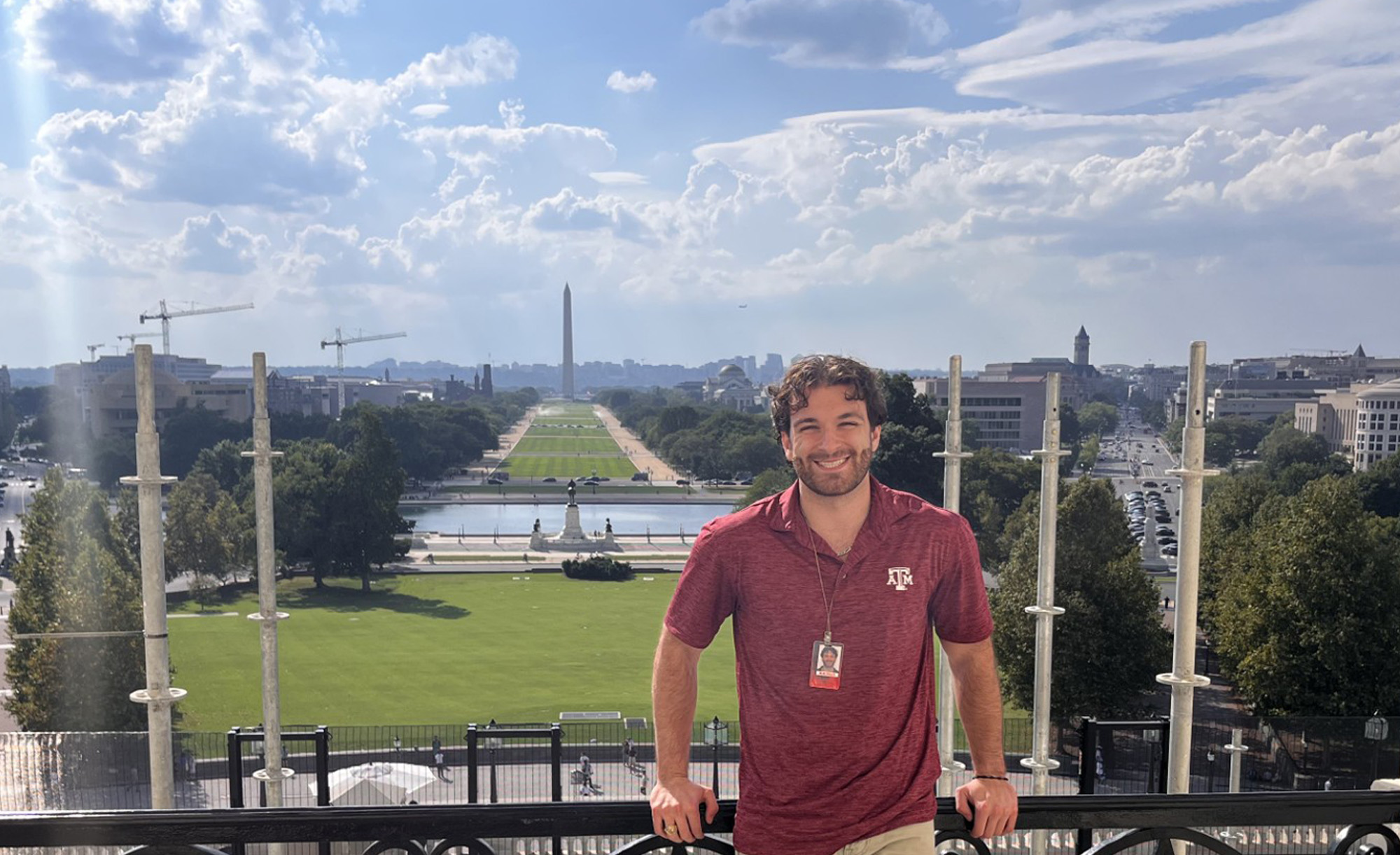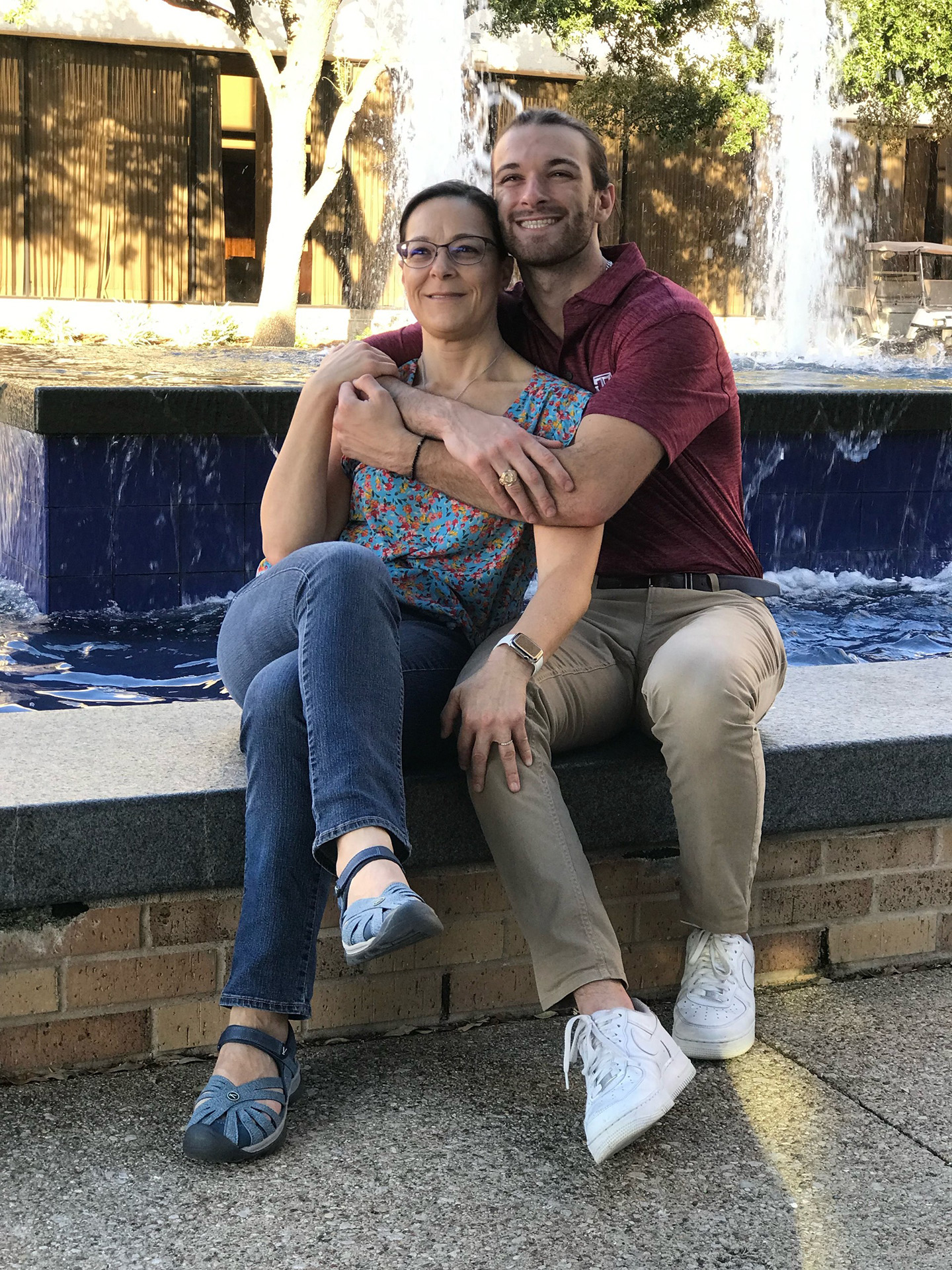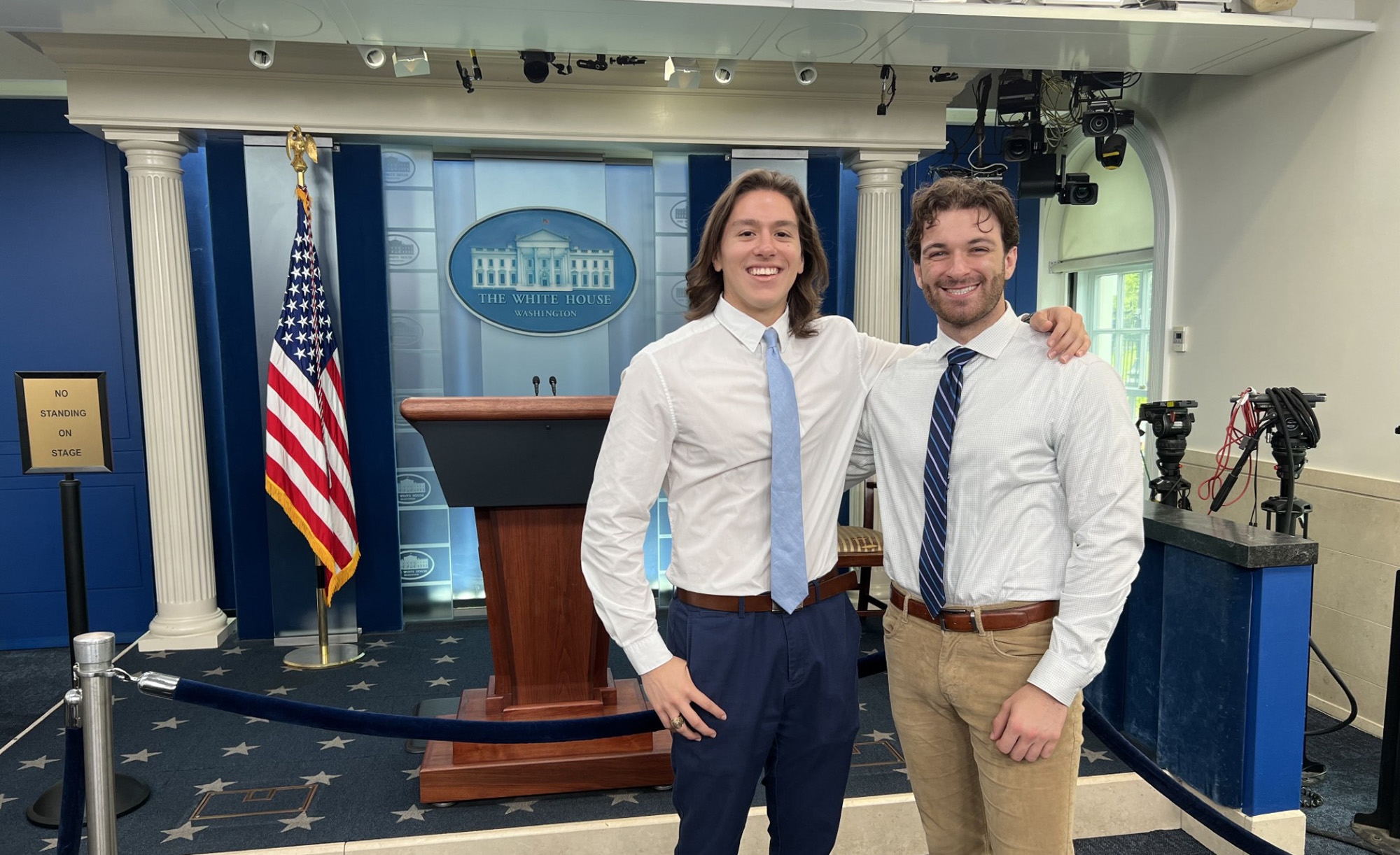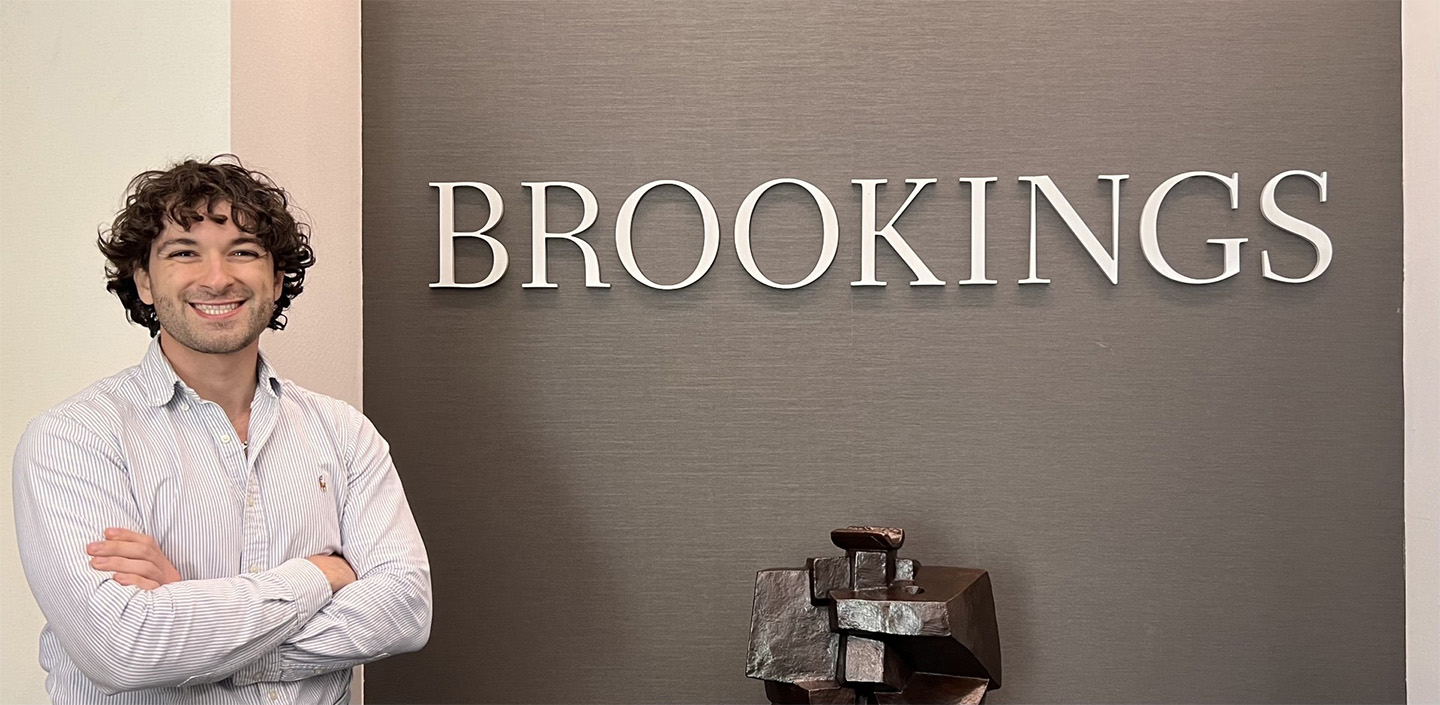
For many college students, the path to career success is straightforward: choose a "practical" major, land a stable job and climb the ladder of promotion. That was not the road that Eric Urby '22 was interested in traveling. A native of New Braunfels, Texas, Urby chose a different path, one that some of his high school teachers and community members cautioned him against: he majored in philosophy and minored in English.
Now a research analyst at the prestigious Brookings Institution, Urby’s career success is a testament to the value of a rigorous humanities education.
Urby is from a working-class, blended family. He was raised primarily by his mother, who owned a small business, and later by his stepfather, a veteran whose benefits helped make attending Texas A&M possible. From this background, Urby understood the importance of choosing a degree with a clear return on investment; however, he rejects the notion that studying philosophy is an unprofitable or elitist pursuit. In an age of increasing mechanization, he argues, a degree that teaches you how to think, communicate, and reason from multiple perspectives is more valuable than ever. It is a skillset that cannot be outsourced or automated and applies to careers in any field.

Small Department, Big University
Though philosophy wasn’t initially on his radar, his mother was the first to suggest it when he began searching for a college major. At the time, he had little exposure to philosophy, but SEAL (Society, Ethics, and Law) gave him a practical entry point. His academic path took a pivotal turn when he accidentally enrolled in a junior-level philosophy of religion course with Dr. Christopher Menzel. That experience opened his eyes to the field, sparked a deep passion and ultimately convinced him to make the jump into philosophy.
Urby appreciated the Department of Philosophy at Texas A&M because it offered the benefits of a large institution combined with the intimate feel of a smaller department, with rich faculty mentorship and a tailored degree program. Just over 200 Texas A&M students major in philosophy, but the department teaches thousands of students each semester.
As part of the first cohort for the Society, Ethics, and Law program in the philosophy department, Urby was able to dive deep into topics that captivated him. The program explores moral, social, political and legal philosophy, with courses that use history and social science to examine relevant topics.

His years at Texas A&M were a blur of activity, but Urby insists it never felt grueling. Fueled by his passion, he pursued an honors thesis supported by the Undergraduate Glasscock Scholars Program on the implications of endowing ecosystems with legal personhood. He also completed research on the survival of democracy in a globalized world and an exploration of aesthetics and whether humans can create instances of the sublime.
“There’s a body of aesthetic philosophy focused on whether human-created objects, such as art and architecture, can be sublime,” he explained. “My research examined whether human beings have the capacity to cause feelings of sublimity in others through their appearance, and how clothing/costumes could contribute to those feelings.”
His research was published and presented at multiple conferences. In addition to a bachelor’s degree, he also earned a certificate in advanced international affairs from the Bush School of Government and Public Service at Texas A&M.
Using funds provided by the Glasscock Center for Humanities Research, Urby traveled to Panama to provide pro bono legal assistance to under-resourced populations through the Legal Brigade. He also participated in the Public Policy Internship Program, which jump-started his career in Washington, D.C.
In his spare time, for just over a year, Urby was editor of Aletheia (that’s Ancient Greek for truth), Texas A&M’s undergraduate philosophy journal.
“Upon reflection, this is one of the brighter spots of my time at Texas A&M,” he said. “As editor-in-chief I tripled the size of the editorial board, increased production from one to three editions annually, standardized the template for the journal’s layout (which I see they still use as of spring 2025) and created a new constitution for the organization.”

During his time with Aletheia, Urby spearheaded additional initiatives that continue today. He worked with faculty adviser Dr. Dwayne Raymond to secure internship credit hours for editorial board members, expanded the call for papers to include philosophy students worldwide and launched the International Virtual Conference for Undergraduate Philosophy. His motivation was simple: to create professional development opportunities for philosophy students at Texas A&M and beyond, like those his peers in business and engineering enjoyed.
In addition to his academic pursuits, Urby was deeply engaged in campus and community life. He served as a Fish Camp counselor and took on a leadership role in a student organization dedicated to sexual assault and mental health awareness, where he led a subcommittee focused on sexual assault prevention. Beyond campus, he gained professional experience as a legal intern with the Hernandez Law Firm in Bryan, Texas, where he worked for a year.
His friends and family worried about burnout, but the work energized Urby. He was doing what he loved.
“Looking back, I realize how every opportunity — whether research, leadership, service or internships — added something unique to my growth. Each experience built on the others, and together they gave me the foundation and confidence I carry into my life and career today.”
Wisdom Versus Knowledge
While his academic research was significant, Urby believes the most valuable lessons were the practical abilities and critical thinking he developed. With guidance from faculty mentor, Dr. Linda Radzik, he discovered the critical difference between reasoning and rationalizing — a lesson that has echoed “time and time again” in his personal and professional journey. Reasoning, he explains, starts with a premise and works toward a conclusion; rationalizing starts with a conclusion and works post hoc to justify it. It’s easy to fall into this thought trap if you’re not aware of it, he said.
Studying philosophy grew his confidence as an independent thinker.
"When you're making an argument in philosophy and more broadly, in the humanities, you cannot rely on hard scientific evidence to prove your point for you. You must have confidence in your methods of reasoning, the examples that you pull from, your intuition, and then be able to say all of this is what proves my point. You can disagree with me, but I know that I believe in it,” he said.
This degree program encourages “you to feel competent as a critical thinker," he said.
The study of philosophy also provided opportunities to interrogate his values and beliefs and, in doing so, to strengthen them. He left Texas A&M with a clearer understanding of what it meant to be a good person and to live a life of integrity, a cornerstone he has found grounding in his career and that he believes can benefit others by investigating the same questions.
“Dr. Kristi Sweet left a lasting mark on me,” he recalled. “She helped me see that some losses feel tragic because they clash with the natural order we expect, while others, though still sad, align with how life unfolds. That perspective has shaped how I process difficult events in my own life and in the lives of those around me.”
From Aggieland To Washington, D.C.
Today, Urby is a research analyst at the Brookings Institution, a top global think tank in Washington, D.C., where he is part of the Anti-Corruption, Democracy and Security team. His role involves extensive research and preparing briefs for senior fellows who, in turn, provide insights to government entities — such as the White House, U.S. Senate and House of Representatives and Department of State — political leaders, news outlet — such as NPR, CNN, The New York Times, Politico and late-night shows — as well as the general public.

Washington, D.C., is an exciting, fast-paced "boot camp for young professionals," said Urby, but it can be easy to develop an unbalanced life in a location that is so focused on world-shaping ideas in a never-ending news cycle.
“What makes D.C. so dynamic is that young professionals get to put their education to work in real time, applying lessons learned in the classroom to fast-paced, high-stakes situations," he said. "For Aggies especially, it’s a place where you can evaluate your training against the kind of intellectual complexities that truly shape the world.”
Urby has learned to integrate himself into a community, carrying forward the seeds planted during his time at Texas A&M. Beyond the fast pace of professional life, he is intentional about cultivating a deeper life — one rooted in community and enriched by moments of reflection. He finds grounding in visiting the National Gallery of Art and museums, walking the city to take in its monuments, architecture and landscapes, and attending events with friends.
“What Texas A&M gave me wasn’t just an education,” he said. “It prepared me to build a meaningful life wherever I go — to seek out community, to keep learning and to feel at home even in a city as dynamic as D.C.”
What’s next for Urby? He recently received an LSAT score that makes him competitive for the nation’s top law schools and is also applying to an international scholars program that would send him to Asia for a year to explore reimagining democracy for the future. He’s still weighing his options, but no matter what he chooses or where that choice will lead, he knows he is equipped to tackle the challenges, thanks to his experiences at Texas A&M. The work he will take on will be intense, “but when I’m doing something that I love, it doesn’t feel like work,” he said.
Help Us Prepare Them For Careers And Global Citizenship
Every Texas A&M student, like Eric Urby, deserves the chance to step beyond the classroom and into experiences that challenge, inspire and prepare them for success. In the College of Arts and Sciences, high-impact learning opportunities are transforming lives. We invite you to be part of that transformation. Learn more on our website, or contact Ophelia Bennett, chief development officer, at obennett@tamu.edu or 979-862-1546.
